
Special Article - Human Chorionic Gonadotropin
Austin J Obstet Gynecol. 2016; 3(2): 1059.
Human Chorionic Gonadotropin is an Ideal Target for Immuno-Contraception, Development of a Potential Birth Control Vaccine with Additional use for Immunotherapy of Advanced Stage Cancers
Talwar GP¹*, Gupta JC¹, Hada RS¹, Nand KN¹, Vyas SP², Vyas HK³ and Rulli SB4
¹Talwar Research Foundation, New Delhi, India
²Alpha Diagnostic International Inc, San Antonio, TX, USA
³Department of Virology and Immunology, Texas Biomedical Research Institute, TX, USA
4Instituto de Biologia y Medicina Experimental CONICET Buenos Aires Argentina, Argentina
*Corresponding author: Talwar GP, Director Research, Talwar Research Foundation, E-8, Neb Valley, Neb Sarai, New Delhi, India
Received: September 08, 2016; Accepted: October 03, 2016; Published: October 06, 2016
Abstract
The making of initial and progressively better, more immunogenic vaccines against hCG is briefly reviewed. Phase I Clinical trials in India, Finland, Sweden, Chile and Brazil have shown the safety and reversibility of the vaccine. Phase II trials have shown that anti-hCG antibodies above 50ng/ ml titres prevent pregnancy in sexually active women without impairment of ovulation and derangement of menstrual regularity. A recombinant anti-hCG has been developed, which is expressed as DNA and protein. Priming with DNA followed by proteinic boosters of the vaccine induces very high titres of antihCG antibodies in mice. Extensive toxicology studies in rodent and marmosets have shown the safety of the recombinant vaccine. Besides contraception, the vaccine may find applications in therapy of terminal drugs-resistant cancers expressing hCG ectopically.
Keywords: Prevention of pregnancy; Ectopic expression of hCG in cancers
Introduction
Human Chorionic Gonadotropin (HCG) is a highly interesting hormone. It is not made or secreted in any meaningful quantity by any organ of a non-pregnant healthy female that is why its appearance in urine or blood is a world-wide used test for diagnosis of pregnancy. It only emerges after fertilization of the egg. The early embryo makes it, an observation [1] which won Bob Edwards a Nobel Prize. HCG plays a crucial role in implantation of the embryo onto the endometrium leading to the onset of pregnancy. Marmoset embryos exposed to anti-hCG antibodies fail to implant, whereas the same embryos exposed to irrelevant immunoglobulins implant perfectly [2]. It is vital to the sustenance of pregnancy. Many years back when I thought of making a possible vaccine for control of fertility, I considered hCG as an ideal target, for intervention.
Rendering hCG immunogenic
HCG is a “self” molecule. The foetus is literally bathing in high levels of hCG during embryonic development. The immune system of any woman would not react to hCG to evoke an immunological response to hCG. It had to be rendered “foreign”, while still preserving the native conformation of the molecule. We thought of linking it to another protein, a carrier to which the immune system of the woman should react readily. Why not link hCG or still better its Beta subunit (being given that alpha subunit of hCG is common to FSH, LH & TSH, three other pituitary hormones) to Tetanus Toxoid (TT)? TT is available in unlimited amounts and at cheap rates. Furthermore, even if the carrier strategy fails to work for hCG, immunization against tetanus will be beneficial to the woman. In those years a large number of women delivering a child in aseptic conditions in the field or home used to die of ante-natal tetanus.
HCG-β-TT was indeed immunogenic
The conjugate of hCGβ-TT had to be tested in women for its ability to induce the formation of anti-hCG antibodies. Four women, who had voluntary tubectomy after having given birth to several children agreed to vaccination. They were given 4 injections of hCG β-TT at fortnightly intervals. To our delight, all of them formed antibodies against both hCG and tetanus [3,4]. These were independent set of antibodies. Administration of a load dose of hCG brought down temporarily the anti-hCG titres without any effect on anti-tetanus titres (Figure 1) is a recapitulation of these observations in one of these women.
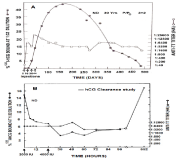
Figure 1: A. Time kinetics of anti-hCG and anti-tetanus antibody response in
subject ND who had 3 live children and 2 Medical terminations of pregnancy,
immunized with four injections of hCGβ-TT at fortnightly intervals.
B. Anti-hCG and anti-tetanus titres in the subject ND after injection of 2000
and 4000 IU of hCG. Circulating antibodies bound with the administered hCG
causing decline of titres, which in course of time returned to the same level
as at the time of challenge. No effect of hCG was seen on anti-tetanus titres
[4,5].
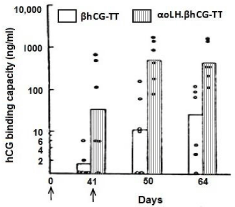
Figure 2: Anti-hCG titers in rats on immunization with αoLH.βhCG-TT
or βhCG-TT. Two injections were given on days 0 and 41. Bleeds were
analyzed on days 41, 50 and 64. Points give the titers in each animal and bar
the geometric mean [6].
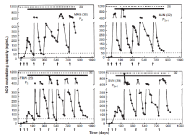
Figure 3: Anti-hCG response to the HSD vaccine in 4 sexually active women
of proven fertility. MRG 30 year old and TRW 23 year old had 2 children
each; MJN 32 year & SVN 29 year old had 2 children each and 1 elective
termination of pregnancy. All of them remained protected from becoming
pregnant over 26-32 cycles. The dots (…) at the top edge represent the
menstrual events which remained regular, solid lines denote the period over
which they were exposed to pregnancy. Booster injections were given to keep
antibody titres above 50ng/ml [10].
Enhancement of Antibody Response
While hCGβ-TT elicited antibodies in all recipients, the titres were not sufficiently high to assure neutralization of the high amounts of hCG prevalent during early pregnancy. To enhance immunogenicity, we considered linking hCGβ with alpha subunit of ovine LH. The ability of alpha subunits to bind with beta subunits of gonadotropins is conserved across species in mammals. The Hetero-Species Dimer (HSD) thus created, consisting of hCGβ. αOLH, was conjugated to the carrier Tetanus Toxoid (TT). The HSD-TT vaccine elicited higher titres of antibodies in both rodents and primates than hCGβ-TT [5].
By employing a dimer immunogen which contained also the alpha subunit, though of ovine origin, not human, there was the possibility that the antibodies could cross-react with other pituitary hormones such as hFSH and hLH which have a common alpha subunit identical to what is present in hCG and hLH. Thus sera from 5 monkeys immunized with HSD-TT/DT were tested for reactivity with hFSH and hTSH. Data in (Table 1) show that none of the sera from 5 different monkeys reacted with either hFSH or hTSH, while all sera were reactive with hCG.
Monkey No.
% Specific binding with iodinated tracer
hcg
hfsh
htsh
Positive Control
70
33
26
96
54
0
0
99
21
0
0
100
57
0
0
101
34
0
0
102
15
0
0
Table 1: Cross reactivity of anti-HSD sera with human FSH and TSH [7].
The sera were no doubt cross-reactive with hLH. A moderate degree of reactivity, so long as it does not prevent ovulation, may be desirable and would be additive to the anti-fertility action of the vaccine. Thau et al [8], showed that immunization of rhesus monkeys with β-OLH rendered the corpus luteum deficient in progesterone production but did not prevent ovulation. Similar was the observation in women immunized with βhCG-TT vaccine. Though the antibodies were partially cross-reactive with hLH, all women continued to ovulate [3,4]. The same was the observation in trials conducted on this vaccine in Sweden, Chile, Brazil, & Finland under the auspices of the International Committee on Contraception Research of the Population Council [9].
Does Anti-hCG vaccine prevent pregnancy?
This crucial question was answered by Phase II efficacy trials. These were conducted in 3 major Institutions of the country after obtaining approval of the Drugs Regulatory Authority & Ethics Committees. 148 women of proven fertility having at least 2 children, who were sexually active were enrolled. They were given 3 primary injections of the vaccine at fortnightly interval. A putative threshold for protection against pregnancy was fixed at antibody titres of 50ng/ ml of hCG binding capacity. IUDs were removed and women exposed to pregnancy at and above these titres. Observations were made for 1224 cycles. Interestingly only 1 pregnancy occurred, indicating fairly high efficacy of anti-hCG antibodies to prevent pregnancy [10]. Figure 3 illustrates the observations in 4 women.
All women kept ovulating as indicated by luteal progesterone levels and continued to have normal menstrual cycles at regular intervals. Eight women completed > 30 cycles without becoming pregnant, 9 between 24 and 29 cycles, 12 completed 18-33 cycles, 15, 12-17 cycles and 21 subjects completed 6-11 cycles of continuous exposure to the risk of pregnancy without becoming pregnant.
The antibody response was reversible in all women and declined to zero levels in course of time unless booster injections were given. Women regained fertility at titres below 20ng/ml. Progeny born to previously immunized women was normal, their developmental landmarks and cognitive abilities were comparable to their siblings [11].
Revival of the vaccine
After a gap of 12 years, the vaccine was revived with financial support from the Department of Biotechnology, Government of India under Indo-US programmes. A genetically engineered vaccine was made, so that it could be amenable to large scale industrial production. The vaccine is hCGβ linked to B subunit of heat labile enterotoxin of E. coli (hCGβ-LTB). Figure 4 gives its nucleotide sequence.
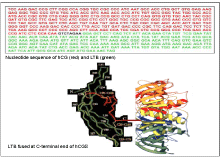
Figure 4: Conceptualized structure of hCGβ-LTB vaccine. The carrier B chain
of heat labile enterotoxin of E. coli (LTB) is fused at C-terminal glutamine of
hCGβ.
It was adsorbed on alum and employed along with MIP as adjuvant. MIP is autoclaved Mycobacterium indicus pranii, previously made vaccine by us against leprosy [12], which is approved by both Drugs Controller General of India and US FDA. HCGβ-TT engendered high titres of bioeffective anti-hCG antibodies in every Balb c mouse and the titres rose up to several thousands of nanograms hCG binding capacity, far beyond the requirements for protection against pregnancy [13].
The vaccine was also immunogenic in various other genetic strains of mice [14]. In each mouse, the antibody response was reversible (Figure 5).
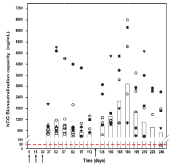
Figure 5: High bio-effective antibody response generated by hCGβ-LTB in
Balb c mice given along with Mycobacterium indicus pranii (MiP) as adjuvant.
Bars give the geometric mean of bioneutralisation capacity determined by
inhibition of 125 I-hCG binding to rat Leydig cell receptors. The symbols
represent the titres in individual mice and bars the geometric means. 50ng/ml
is the protective threshold against pregnancy in women [13].
DNA priming enhances further antibody response
Recombinant molecules can be expressed as DNA and or Proteins. To induce antibody response, we have to give 3 primary injections, thereafter a single injection serves fairly well as a booster to raise the titres. We observed that in case DNA form of the vaccine is used for the first 2 primary injections followed by 3rd given as protein, the antibody titres get notably enhanced. Figure 6 gives the typical results in mice.
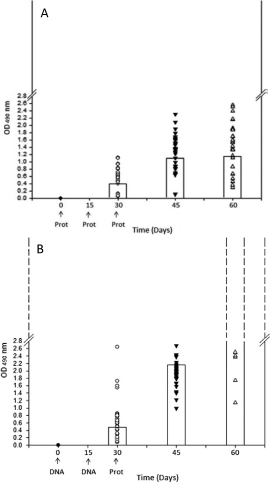
Figure 6: Effect of DNA priming on antibody titres in Balb/C mice. (A) Anti
hCG antibodies after 3 injections of proteinic form of the vaccine administered
intra-muscularly. (B) Anti hCG antibodies titres in mice primed twice with DNA
form of the recombinant hCGβ-LTB vaccine followed by the 3rd injection with
proteinic form of the vaccine. Symbols represent the individual values, while
bars gives the geometric mean at various time points post immunization. On
day 60, the antibody titres in 35 out of 40 mice were higher than the scale [15].
DNA is cheaper to make and does not require cold chain for transport. Thus our recombinant vaccine is planned to be used as both DNA and protein, DNA will be employed for the first 2 primary injections and protein form of the vaccine thereafter.
Approval of the recombinant vaccine by RCGM
All genetically engineered products have to receive the approval of the National level Review Committee on Genetic Manipulation (RCGM) before these are considered for human use. RCGM approved the vaccine in principle but demanded extensive toxicology studies on an International Protocol in 2 rodent species and in one sub-human primate species.
Pre-clinical safety and efficacy studies on hCGβ-LTB vaccine in marmosets
Pre-clinical toxicology, safety and efficacy studies were undertaken in a sub-human primate species, the marmosets at the National Institute for Research in Reproductive Health, Mumbai. Normal cycling adult female marmosets were immunized intramuscularly twice with DNA version of the vaccine along with autoclaved MIP (Mycobacterium indicus pranii) as adjuvant at two weeks interval. DNA primed animals were distributed in 3 groups of 3 animals each, and immunized with either 20μg, 40μg or 80μg of the proteininc form of hCGβ-LTB vaccine along with MiP as an adjuvant. Marmosets comprising the control group were immunized with only MiP adjuvant. Notable enhancement of immunogenicity of the vaccine was observed with the DNA prime-protein boost approach. Immunization with DNA and recombinant protein of hCGβ-LTB vaccine did not have any adverse effect on the body weight, food intake and on the general alertness of the immunized animals. Their haematological and biochemical parameters remained normal.
All immunized and control animals were then co-habitated with adult fertile male marmosets for two weeks per cycle and observed for their fertility for 6 months. Except for one animal out of 9, none of the immunized females became pregnant, whereas all animals in the control group conceived. Six months after the time when no booster injections were given, all immunized animals regained fertility following the decline of antibody titers, thus indicating reversibility of the block of pregnancy.
Pre-clinical Toxicology studies on hCGβ-LTB in rodents
Pre-clinical toxicology studies were carried out in rodents, by M/s Bioneeds at their GLP Facility in Bangalore India. Studies also covered bio safety issues related to Genetically Modified Organisms and Schedule ‘Y’ guide-lines on Drugs and Cosmetics.
It was observed that both DNA and protein forms of the vaccine did not sensitize the skin of guinea pigs. There were no clinical signs of toxicity, and body weight charts were similar in control and immunized group of animals. The two forms (DNA, protein) of hCGβ-LTB vaccine were non-mutagenic both by Bacterial Reverse Mutation and Mammalian Chromosome Aberration Tests. Similar observations were made on In vivo Mammalian Erythrocyte Micronucleus Test conducted in mice.
Single dose acute toxicity study was conducted in Sprague Dawley rats. No mortality, clinical signs of toxicity and treatment related changes in the body weight were recorded in vaccinated rats. Changes in gross pathology (external and internal) were not observed at even the highest dose (10 ×) tested. Both DNA and protein form of hCG-LTB were also tested up to 10 times human dose of the vaccines in rats with repeat doses. Rats were followed up to 90 days post-immunization and showed no treatment related changes in physical, physiological, clinical and haematological indices. No histopathological changes were observed in any organ. Segment II studies conducted in rats showed that both DNA and protein forms of the vaccine did not affect the embryo-fetal development, body weight and food consumption. Gross pathology was normal in mothers without any abnormal effect on fetal sex ratio, fetal weight, external and visceral fetal skeleton. Thus extensive toxicology studies on the hCGβ-LTB vaccine in 2 species of rodents and in a sub-human primate species, the marmosets, demonstrated the total safety of both DNA and protein versions of the recombinant hCGβ-LTB vaccine.
Preventive action of the vaccine against Obesity and Insulin Resistance
Susana Rulli in Buenos Aires (Argentina) has ‘humanized’ mice by making them transgenic for hCGβ [16]. The transgenic mice make hCGβ which links non covalently with the alpha subunits of mouse FSH and LH to generate bioactive hCG. The circulating hCG stimulates continuously the production of progesterone in female mice, which in turn promotes the production of prolactin, and causes hypertrophy of pituitary and mammary tumors. The transgenic mice become quite obese. They also develop insulin resistance. These are typical features of Metabolic Syndrome in humans. Immunization of these mice with the recombinant hCGβ-LTB vaccine at young age before they become obese prevents both obesity and Insulin resistance (Figure 7, 8).
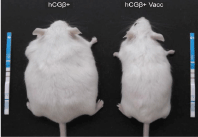
Figure 7: Physical appearance of an hCGβ transgenic mouse immunized
with anti-hCG vaccine and control of the same age [17].
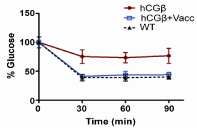
Figure 8: Insulin tolerance test in transgenic hCGβ mice, and those
immunized with anti-hCG vaccine at 9 months of age (p<0.05). Also given is
the response in corresponding non-transgenic mice WT [17].
Antibodies generated by the vaccine inactivated the circulating hCG, preventing the rise of progesterone, prolactin and pituitary adrenal hyper function.
This property of the vaccine is of great interest as obesity is a rising worldwide problem; in USA approximately 65% of population is overweight. Also type II diabetes manifested by insulin resistance is a major problem of middle age women in “well to do” middle class families. Along with Susana Rulli we tried to see whether vaccination of these mice after they become obese can reverse obesity. This was not achieved, although vaccination at young age preventing both obesity and insulin resistance was repeatable observation.
Curiously, besides pregnancy, hCG is also expressed ectopically by many advanced stage cancers
In recent years, many papers have appeared which report the expression of hCG and or its subunits, by a variety of cancers; lung cancer [18], bladder carcinoma [19,20], colorectal cancers [21], pancreatic tumors [22,23], oral cancers [24,25], vulvo vaginal cancers [26,27], prostate carcinoma [28] and gastric cancers [29,30]. Invariably the stage at which ectopic expression of hCG is observed in such cancers, the tumor is already metastasized, and patients become refractory to available chemotherapeutic drugs. They are destined to die in the near future. Interestingly antibodies against hCG kill such cancer cells. Figure 9 is an example, which shows the cytotoxic action of an anti-hCG monoclonal antibody against A549 lung cancer obtained from a patient dying of such cancer [17].
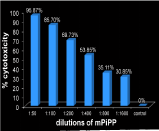
Figure 9: Dose Dependent Cytotoxicity exercised by a monoclonal anti-hCGantibody
cPiPP on Lung Cancer cells (A549) [17].
At times antibodies alone or in presence of complement fail to kill some cancer cells expressing hCG, such as those of MOLT-4 lymphoblastic leukemia. Employing in such cases, anti-hCG antibody linked to a totally safe compound, Curcumin succeeds in killing 100% of such cancer cells as shown in Figure 10. Using these “magic bullets” saves also the high cost of repeat administration of monoclonal antibodies employed for therapy.
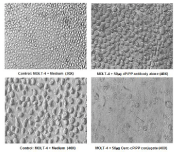
Figure 10: Photomicrograph of MOLT-4 cells after incubation with cPiPP
alone and cPiPP conjugated with curcumin. Cells incubated in culture
medium are used as control [31].
Current Status
The recombinant hCGβ-LTB in both DNA and Protein form is highly immunogenic. It has received the approval of RCGM. Extensive toxicology studies have shown full safety. It is devoid of mutagenic and sensitization traits. The vaccine has been passed on to a Biotech Company, who would provide both DNA & Protein form of the vaccine prepared under GMP conditions for clinical trials. These would be conducted under the aegis of the Indian Council of Medical Research after obtaining the approval of DCGI and Institutional Ethics Committees.
Acknowledgement
The work reviewed in this article was carried out with research grants from the Department of Biotechnology, the Department of Science and Technology, Govt of India and the Indian Council of Medical Research.
References
- Fishel SB, Edwards RG, Evans CJ. Human chorionic gonadotropin secreted by pre-implantation embryo cultured in vitro. Science. 1984; 223: 816-818.
- Hearn JP, Gidley-Baird AA, Hodges JK, Summers PM, Webley GE. Embryonic signals during the pre-implantation period in primates. J Reperod Fertil. 1988; 36: 49-58.
- Talwar GP, Sharma NC, Dubey SK, Salahuddin M, Das C, Ramakrishnan S, et al. Isoimmunization against human chorionic gonadotropin with conjugates of processed β-subunit of the hormone and tetanus toxoid. Proc Natl Acad Sci USA. 1976; 73: 218-222.
- Talwar GP, Dubey SK, Salahuddin M, Das C, Hingorani V, Kumar S. Antibody response to Pr-β-hCG-TT vaccine in human subjects. Contraception. 1976; 13: 237-243.
- Ramakrishnan S, Dubey SK, Das C, Salahuddin M, Talwar GP, Kumar S, Hingorani V. Influence of hCG and tetanus toxoid injections on the antibody titers in a subject immunized with Pr-β-hCG-TT. Contraception. 1976; 13: 245-251.
- Talwar GP, Singh O. Birth control vaccines inducing antibodies against chorionic gonadotropin. In: G.P. Talwar (ed), Contraception Research for Today and the Nineties. Springer-Verlag New York Inc. 1988; 183-197.
- Talwar GP, Singh O, Rao LV. An improved immunogen for anti-hCG vaccine reactive with conformation native to the hormone without cross-reaction with human follicle stimulating hormone and human thyroid stimulating hormone. J Reprod Immunol. 1988; 14: 203-213.
- Thau R, Sundaram K, Thornton YS. Effects of immunization with the β-subunit of ovine luteinizing hormone on corpus luteum function in rhesus monkey. Fertil Steril. 1979; 31: 200-204.
- Nash H, Talwar GP, Segal S, Luukainen T, Johansson EDB, Vasquez J, et al. Observations on the antigenicity and clinical effects of a candidate antipregnancy vaccine: β-subunit of human chorionic gonadotropin linked to tetanus toxoid. Fertil Steril. 1980; 34: 328.
- Talwar GP, Singh O, Pal R, Chatterjee N, Sahai P, K Dhall, et al. A vaccine that prevents pregnancy in women. Proc Natl Acad Sci USA. 1994; 91: 8532-8536.
- Singh M, Das SK, Suri S, Singh O, Talwar GP. Regain of fertility and normality of progeny born at below protective threshold antibody titres in women immunized with HSD-TT vaccine. Am J Reprod Immunol. 1998; 39: 395-398.
- Talwar GP, Singh P, Atrey N, Gupta JC. Making of a highly useful multipurpose vaccine. J Transl Sci. 2016; 1: 69-73.
- Purswani S, Talwar GP. Development of a highly immunogenic recombinant candidate vaccine against human chorionic gonadotropin. Vaccine. 2011; 29: 2341-2348.
- Purswani S, Talwar GP, Vohra R, Pal R, Panda AK, Lohiya NK, et al. Mycobacterium indicus praniiis a potent immunomodulator for a recombinant vaccine against human chorionic gonadotropin. J Reprod Immunol. 2011; 91: 24-30.
- Nand KN, Gupta JC, Panda AK, Jain SK, Talwar GP. Priming with DNA enhances considerably the immunogenicity of hCGβ-LTB vaccine. Am J Reprod Immunol. 2015; 74: 302-308.
- Rulli SB, Kuorelahti A, Karaer O, Pelliniemi LI, Poutanen M, et al. Reproductive disturbances, pituitary lactotrope adenomas and mammary gland tumours in transgenic female mice producing high levels of human chorionic gonadotropin. Endocrinology. 2002; 143: 4084-4095.
- Talwar GP, Rulli SB, Vyas H, Purswani S, Kabeer RS, Chopra P, et al. Making of a unique birth control vaccine against hCG with additional potential of therapy of advanced stage cancers and prevention of obesity and insulin resitance. J Cell Sci Ther. 2014; 5: 159.
- Yokotani T, Koizumi T, Taniguchi R, Nakagawa T, Isobe T, Yoshimura M, et al. Expression of alpha and beta genes of human chorionic gonadotropin in lung cancer. Int J Cancer. 1997; 71: 539-544.
- Iles RK, Persad R, Trivedi M, Sharma KB, Dickinson A, Smith P, et al. Urinary concentration of human chorionic gonadotrophin and its fragments as a prognostic marker in bladder cancer. Br J Urol. 1996; 77: 61-69.
- Nishimura R, Koizumi T, Morisue K, Yamanaka N, Lalwani R, Yoshimura M, et al. Expression and secretion of the beta subunit of human chorionic gonadotropin by bladder carcinoma in vivo and in vitro. Cancer Res. 1995; 55: 1479-1484.
- Lundin M, Nordling S, Carpelan-Holmstrom M, Louhimo J, Alfthan H, Stenman UH, et al. A comparison of serum and tissue hCG beta as prognostic markers in colorectal cancer. Anticancer Res. 2000; 20: 4949-4951.
- Syrigos KN, Fyssas I, Konstandoulakis MM, Harrington KJ, Papadopoulos S, N Milingos, et al. Beta human chorionic gonadotropin concentrations in serum of patients with pancreatic adenocarcinoma. Gut. 1998; 42: 88-91.
- Alfthan H, Haglund C, Roberts P, Stenman UH. Elevation of free beta subunit of human choriogonadotropin and core beta fragment of human choriogonadotropin in the serum and urine of patients with malignant pancreatic and biliary disease. Cancer Res. 1992; 52: 4628-4633.
- Hedström J, Grenman R, Ramsay H, Finne P, Lundin J, Haglund C, et al. Concentration of free hCGbeta subunit in serum as a prognostic marker for squamous-cell carcinoma of the oral cavity and oropharynx. Int J Cancer. 1999; 84: 525-528.
- Bhalang K, Kafrawy AH, Miles DA. Immunohistochemical study of the expression of human chorionic gonadotropin-beta in oral squamous cell carcinoma. Cancer. 1999; 85: 757-762.
- de Bruijn HW, ten Hoor KA, Krans M, van der Zee AG. Rising serum values of beta-subunit human chorionic gonadotrophin (hCG) in patients with progressive vulvar carcinomas. Br J Cancer. 1997; 75: 1217-1218.
- Carter PG, Iles RK, Neven P, Ind TE, Shepherd JH, et al.) Measurement of urinary beta core fragment of human chorionic gonadotrophin in women with vulvovaginal malignancy and its prognostic significance. Br J Cancer. 1995; 71: 350-353.
- Sheaff MT, Martin JE, Badenoch DF, Baithun SI. beta hCG as a prognostic marker in adenocarcinoma of the prostate. J Clin Pathol. 1996; 49: 329-332.
- Rau B, Below C, Liebrich W, von Schilling C, Schlag PM. Significance of serum b-hCG as a tumor marker for stomach carcinoma. Langenbecks Arch Chir. 1995; 380: 359-364.
- Louhimo J, Nordling S, Alfthan H, von Boguslawski K, Stenman UH, Haglund C. Specific staining of human chorionic gonadotropin beta in benign and malignant gastrointestinal tissues with monoclonal antibodies. Histopathology. 2001; 38: 418-424.
- Vyas HK, Pal R, Vishwakarma R, Lohiya NK, Talwar GP. Selective killing of leukemia and lymphoma cells ectopically expressing hCG beta by a conjugate of curcumin with an antibody against hCG beta subunit. Oncology. 2009; 76: 101-111.
Citation: Talwar GP, Gupta JC, Hada RS, Nand KN, Vyas SP, Vyas HK, et al. Human Chorionic Gonadotropin is an Ideal Target for Immuno-Contraception, Development of a Potential Birth Control Vaccine with Additional use for Immunotherapy of Advanced Stage Cancers. Austin J Obstet Gynecol. 2016; 3(2): 1059.